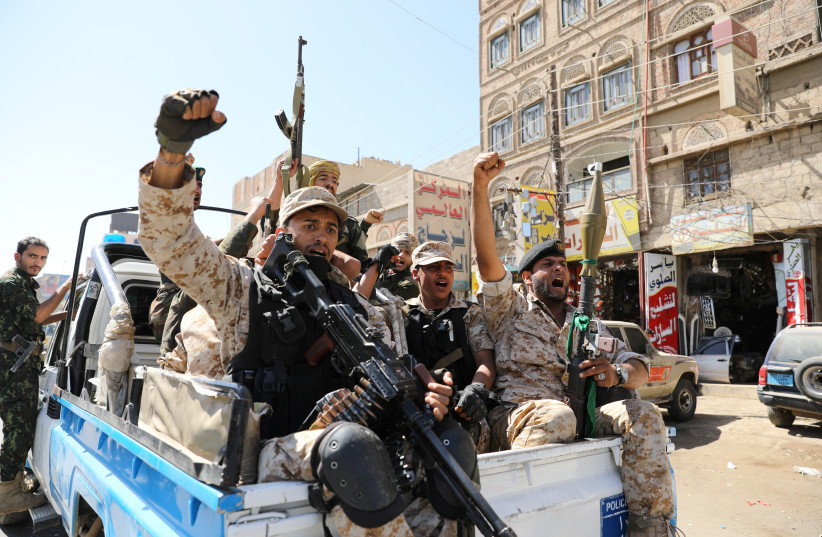In a country that still considers singing and art in general as religious and social taboos, many artists in its various regions are looked upon as from the lower class of society. which has limited the spread of culture in the community for many years. However, in recent years a group of female artists appeared in Yemen to form an artistic and cultural movement, which has been accepted by some and opposed by traditionalists.
For more stories from The Media Line go to themedialine.org
Upon seizing power in Sanaa and other Yemeni cities in the north, the Ansar Allah group (the Houthi movement), the northern de facto authority, posed the greatest threat to the new artistic movement through repeated harassment and decisions limiting women from singing on many occasions.
Areej Al-Sayed, 27, is a Yemeni artist and model who won the Miss Yemen Award in 2017. She told the Media Line that Yemen is not an encouraging environment for female artists, many of whom suffer harassment and threats, forcing them to appear abroad and even emigrate. Al-Sayed traveled to Egypt and other countries to be able to sing and work as a model.
Fatima Muthana, another young Yemeni artist, asserts that singing is a peaceful expression of the heritage and culture of Yemen. Muthana tells The Media Line that female artists in Yemen are at war with part of society and are neglected by the other part, but she will keep singing.
War on art and artists
Despite the restrictions imposed after Ansar Allah took control of the north, many female artists appeared on the music scene during the years of Yemen’s war. Others decided to travel to neighboring countries to find a better environment to perform. Young artist Nourhan Khaled traveled to Cairo, where she studied at the Academy of Arts and performed her art.

“Like me, there are many girls who were harassed and decided to travel or refrain from singing. Strong talents and charming voices were silenced because of the harassment.”
Nourhan Khaled, artist
Khaled sang on many occasions and at parties in Yemen before she was harassed and threatened so much on social media that she was forced to travel abroad to perform. “It’s the thing I love the most,” she told The Media Line. “Like me, there are many girls who were harassed and decided to travel or refrain from singing. Strong talents and charming voices were silenced because of the harassment.”
Muthana was also harassed by her community because of her singing, a situation she described as “a war on art and artists. The state does not give us any attention or support. Society is the biggest obstacle. It views women’s singing as a decline in social values. Singers are outcasted.”
Muthana believes that art is a sublime message that speaks to the soul and sends a valuable message that supports peace and renounces violence, war, and hatred. She believes that social issues can be discussed, that people’s dreams can be realized through music and art, and that many songs find their way to people’s hearts and inspire them.
She is proud of her singing and calls for abandoning some customs and traditions that restrict women and prevent them from singing. Muthana has performed many songs that have been popular and gained wide acceptance. She seeks through her songs to renew Yemeni art and present it in the best possible way: by supporting peace and social cohesion and highlighting people’s concerns.
Closed parties and threats of imprisonment
Culture Ministry official Noah Muhammad spoke to the Media Line about the difficulties facing art and artists. He explained that before 2014 and before Ansar Allah took control of the capital Sanaa, there was openness and acceptance by the ministry of women’s singing and of airing their art on the state’s official media. This was a great encouragement for female artists, traditional dancers, and actresses.
“This was evident in the art movement of female artists during the years preceding the war in Yemen. This approach has completely changed since the Houthis seized power,” said Muhammad. “Many female artists who have been threatened and banned from singing at recorded events and wedding parties, the majority, have left singing completely or have decided to travel to neighboring countries to perform.”
Those who remained in the country are singing in complete secrecy, at closed wedding parties, or via the internet. The latter does not necessarily protect female artists from being harassed or imprisoned in some cases.
“Ansar Allah’s approach, through the individual acts of the group’s members or by official decisions, seeks to limit the role of art and female artists specifically and combat it,” concluded Muhammad.
ISIS in Sanaa: The Houthi version
The Local Administration Ministry in Sanaa announced that district security directors are to limit “the spread of male and female artists at parties and events” to “preserve customs and traditions and consolidate faith identity.”
Ansar Allah has suspended many events and celebrations due to the presence of women performing traditional dances, playing musical instruments, or singing. Parliament member Ahmed Saif Hashid tweeted that these measures against artists are “the Houthi version of ISIS in Sanaa.”
Ansar Allah has prevented women from attending music institutes in Sanaa and other cities under its control and banned young girls from singing and dancing at school parties and public events, describing this as an urgent necessity to preserve customs, traditions and national identity.
Yemen has been suffering a seven-year civil war in which the Saudi-led Arab coalition, the internationally recognized government of Yemen and the Ansar Allah in the north of Yemen are all fighting for power. The war has negatively impacted all aspects of civilian life in Yemen, particularly culture and arts.
